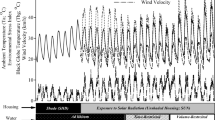Abstract
Previous research on the renal conditional reflex (CR) has resulted in contradictory data. The work of Bykov with dogs and of Hoferet al. with humans indicated that a renal CR is possible, but the experiments of Corsonet al. and Watt and Gantt with dogs having normal or transplanted cervical kidneys showed no clear-cut renal CR’s. The present work supports the latter finding.
Three female mongrel dogs were used. One dog (normal) had an externalized ureter; the other two (experimental) had denervated cervical kidneys (autografts). In 155 days of experiments, the investigators found diuresis to occur only on unconditional stimulus,i.e., only when a dog drank diluted milk (one part milk to four parts water)ad lib.; the dogs drank an average of between 500 and 1,100 ml. No diuresis occurred when 30 ml. of the mixture were given (conditional stimulus). Urinalysis indicated a lack of renal conditioning with respect to the excretion rates and the concentrations of creatinine and electrolytes, except for the sodium concentration in the normal dog’s urine, which decreased on bothad lib and test (30 ml) days; the volume was not affected.
Conclusion: Drinking a small quantity of diluted milk as a conditional stimulus did not produce a conditional diuretic response either in the normal dog or in the two dogs with transplanted kidneys.
Similar content being viewed by others
References
Baker, F. W., Gantt, W. H., and Livingston, A., Jr.: Twenty-third International Congress of Physiological Science. Tokyo, (Sept.) Abstract 21, p. 26, 1965.
Barnes, R., and Schottstaedt, W. W.: The relation of emotional state to renal excretion of water and electrolytes in patients with congestive heart failure.Amer. J. Med.,29: 217, 1960.
Bykov, K. M.:The Cerebral Cortex and The Internal Organs. New York, Chemical Publishing Co., Inc., 1957.
Corson, Samuel A.: Conditioning of water and electrolyte excretion. In Levine, R.:Endocrines and the Central Nervous System. Baltimore, The Williams and Wilkins Company, 1966, pp. 140–199.
Dykman, R. A., Corson, S. A., Reese, G. W., and Seager, L. D.: Inhibition of urine flow as a component of the conditional defense reaction.Psychom. Med.,24: 2, 1962.
Hawk, P. B., Oser, B. L., and Summerson, W. H.:Practical Physiological Chemistry. Philadelphia, The Blakiston Co., 1947, pp. 839–842.
Hofer, M. A., and Hinkle, L. E.: Production of conditioned diuresis in man.J. Clin. Invest.,48: 9, 1963.
Sendroy, J.: Photoelectric microdetermination of chlorides in biological fluids and of iodate and iodine in protein free solutions.J. Biol. Chem.,130: 605, 1939.
Author information
Authors and Affiliations
Rights and permissions
About this article
Cite this article
Livingston, A., Gantt, W.H. An attempt to condition components of urine formation in dogs. Conditional Reflex 3, 241–253 (1968). https://doi.org/10.1007/BF03000094
Issue Date:
DOI: https://doi.org/10.1007/BF03000094




